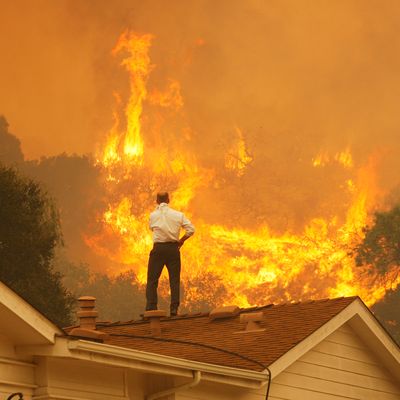
By the year 2040, the world could see massive food shortages, endless wildfires, and coastal flooding that has a disproportionately horrific effect on vulnerable populations. If global leaders do nothing to change the emissions currently being pumped into the atmosphere, that future is a lock, says a new report from the United Nations Intergovernmental Panel on Climate Change.
But it’s not too late to avoid that fate. At least, in theory. The report, authored by 91 scientists from 40 countries, focuses on the effects of a 1.5 degree Celsius, or 2.7 degree Fahrenheit, increase in temperatures. But even limiting global temperature increases to that level, which would mitigate the chain reaction of global catastrophes that would come with a more dramatic increase, requires “rapid and far-reaching” changes for which there is “no documented historic precedent.”
Among the changes suggested in the report are a more than 1 billion ton reduction in emissions for each year in the next decade. That would be roughly equivalent to eliminating all emissions from Japan in each of the next 10 years. By 2050, coal must be all but eliminated as an energy source and renewable sources should make up a third of the electricity market, the report says.
These proposals would obviously encounter strident opposition from the energy industry. But one way to encourage reaching these highly ambitious goals is a fantastically high carbon tax, the Times explains:
The report emphasizes the potential role of a tax on carbon dioxide emissions. “A price on carbon is central to prompt mitigation,” the report concludes. It estimates that to be effective, such a price would have to range from $135 to $5,500 per ton of carbon dioxide pollution in 2030, and from $690 to $27,000 per ton by 2100.
By comparison, under the Obama administration, government economists estimated that an appropriate price on carbon would be in the range of $50 per ton. Under the Trump administration, that figure was lowered to about $7 per ton.
The authors don’t just want to see massive reductions in greenhouse gases, they want to see emissions extracted from the environment with large-scale “negative emissions” systems, which haven’t even been developed yet.
But creating the systems needed to clean dirty air on a global scale might be easier than convincing stubborn world leaders to join the effort. Jim Skea, a co-chair of the IPCC, says this report is all the scientific community can do. “Frankly, we’ve delivered a message to the governments,” he said in a press conference. “It’s now their responsibility … to decide whether they can act on it.”





























